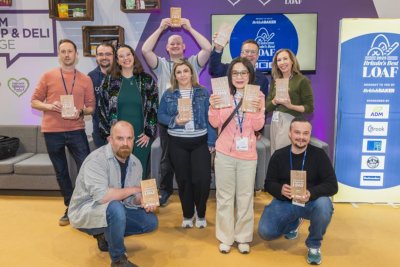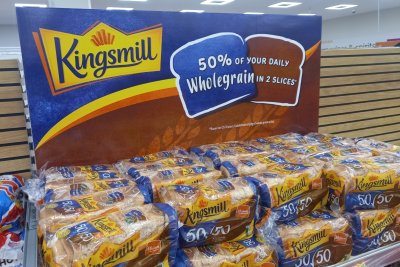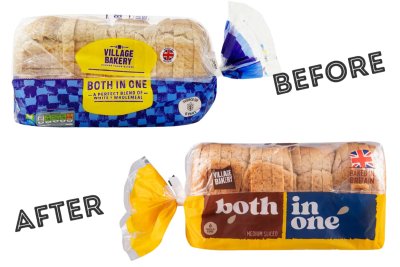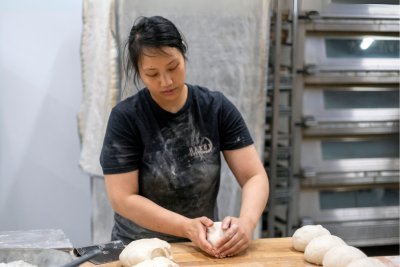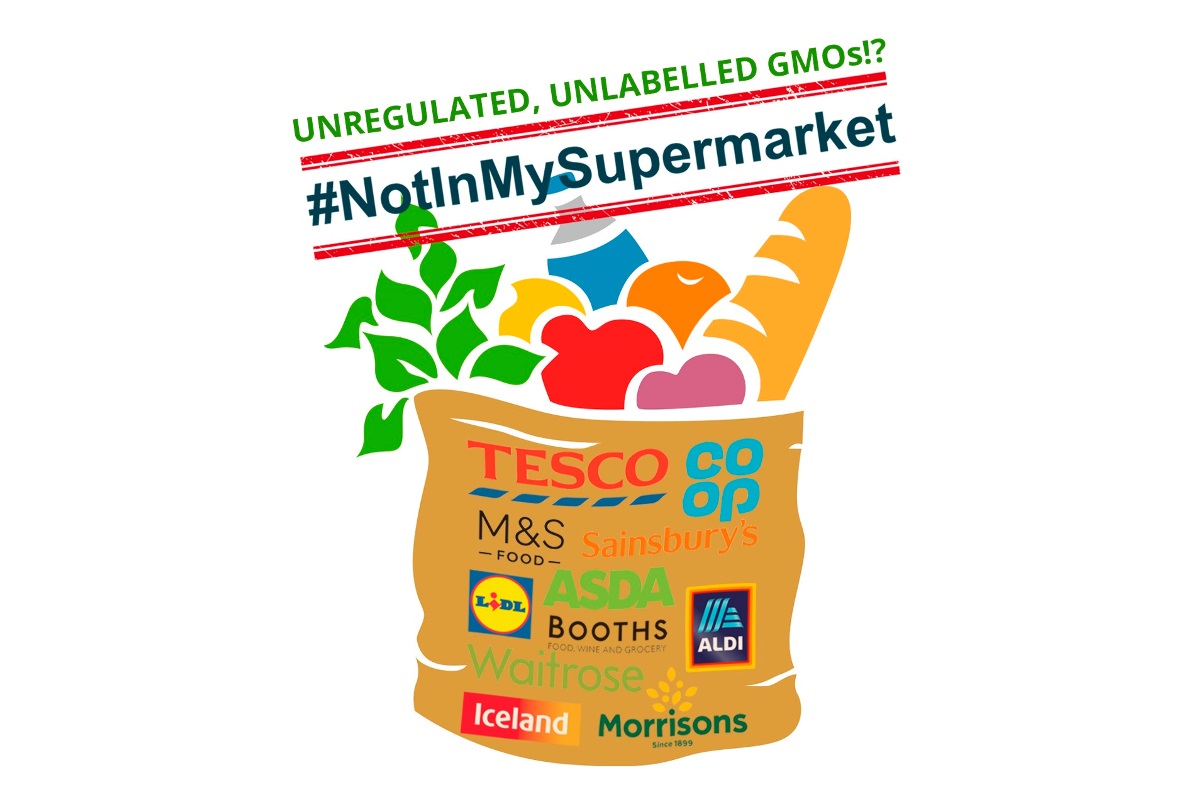
Supermarkets urged to reject gene edited foods
The Real Bread Campaign amongst signatories of letter to UK multiple retailers.
Leaders from food, farming, student activism, religion, business, democratic reform and academia have written to British supermarkets asking them to refuse to stock foods produced from unregulated and unlabelled gene-edited crops and animals.
The more than 50 signatories to the joint letter represent a broad range of interests and the concerns of millions of supporters and members throughout the UK.
The letter
We are writing to you, as leaders from civil society and the food and agriculture sector, who are committed to high quality food and farming and to supporting high quality retailers. As you will be aware, on 7 January the Government announced a 10-week consultation on deregulating gene-edited plants and animals produced for food. At the same time it has made several incorrect statements suggesting that new gene editing techniques are the same as traditional breeding. These statements fly in the face of existing scientific knowledge and the 2018 European Court of Justice ruling.
That ruling made it clear that, both scientifically and legally, gene editing is the same as genetic engineering and that gene edited crops and animals are genetically modified organisms (GMOs). The ruling also stated: “the risks linked to the use of those new techniques…might prove to be similar to those which result from the production and release of a GMO”. These risks include multiple off-target effects which could be harmful to human health and the environment. In the case of gene edited
livestock, the inherent animal welfare issues and societal concerns further indicate the need for robust regulation.
The push for deregulation has ramifications for trade and we particularly note Stormont’s concern about negative consequences for trade with Northern Ireland, as these products are unlawful in the EU. We are very aware of the very real difficulties your stores are experiencing having to deal with dual regulations in your Northern Ireland retail estate. Deregulation has the very real potential to compound these difficulties significantly.
The Scottish and Welsh Governments have been clear that they will maintain their prohibition on producing GMO crops and animals, but UK internal market rules could stop them taking action to prevent sales of GMO products approved in England. This is a recipe for consumer confusion and significant operational difficulties for retailers.
The public – your customers – remains overwhelmingly against genetically engineered foods. A 2020 survey by Food Standards Scotland found that, next to chlorinated chicken, genetically engineered foods are a top issue of concern for 57% of consumers. Another 2020 study conducted by the National Centre for Social Research, which focused on Brexit-related issues, found that 59% wish to maintain a ban on genetically engineered crops. Yet another survey, in 2021, by the UK’s Economic and Social Research Council found that 64% of those who took part were opposed to the cultivation of genetically engineered food.
The experience of over two decades has shown us that genetic engineering has not delivered positive results for agriculture. In contrast, traditional breeding techniques are delivering the safe and nutritious food that British consumers want. Retailers have the power to shift the balance away from short-term technofixes towards ecological farming systems that promote longer-term sustainability. European retailers such as Aldi, Carrefour, EDEKA, Kaufland, Lidl, Rewe and SPAR have been following a strict non-GMO policy for many years and are already reaping the commercial benefits of their non-GMO policies.
We are asking you, as one of the UK’s leading retailers, to listen to your customers, to be respectful of nature and science, to be mindful of the future and to demonstrate leadership by joining us in opposing the deregulation of genome edited crops and livestock in England and the rest of the UK. Please issue a statement opposing deregulation and reassuring your customers that you will not stock these experimental and inadequately researched foods, should they be allowed under UK law.
We look forward to your response.
YOU can help make a difference
If you don’t want genetically engineered/gene edited food (GMOs) sold in the UK you can write to supermarket CEOs and take to social media using the hashtag #NotInMySupermarket.
Beyond GM toolkit of suggested social media posts, artwork and more
You can also respond to the Defra consultation by 10 March 2021
Read full details on the Beyond GM website
The signatories
Pat Thomas
Director, Beyond GM
Shane Holland
Executive Chairman, Slow Food in the UK
Deborah Tomkins
George Dow
Co-Chairs, Green Christian
Jamie Agombar
Executive Director, Students Organising for Sustainability
Helen Browning
Chief Executive, Soil Association
Liz O’Neill
Director, GM Freeze
Patrick Holden
Founder and Chief Executive, Sustainable Food Trust
Prof Tim Lang
Professor Emeritus of Food Policy, Centre for Food Policy, City University
Claire Robinson
Editor, GMWatch
Jyoti Fernandes
Director, Landworkers’ Alliance
Roger Kerr
Chief Executive, Organic Farmers and Growers
Jimmy Woodrow
Executive Director, Pasture-Fed Livestock Association
Peter Kindersley
Trustee, Sheepdrove Trust
Guy Singh-Watson
Founder, Riverford Organic Farmers
Josie Cohen
Head of Policy and Campaigns, Pesticide Action Network UK (PAN UK)
Anna Van Der Hurd
CEO, A-Team Foundation
Tracy Worcester
Director, Farms Not Factories
Christopher Stopes
Adrian Steele
Co-Chairs, English Organic Forum
Prof Martin Caraher
Professor Emeritus of Food and Health Policy at the Centre for Food Policy, City University
Lucy MacLennan
Chief Executive, Organic Research Centre
Robert Reed
Grants Manager, Farming the Future
Kate McEvoy
Ben Gabel
Directors, Real Seeds
Cristina Dimetto
General Manager, Organic Trade Board
Jacqueline Pearce-Dickens
CEO, Whole Health Agriculture
Clare Marriage
Chief Executive, Doves Farm
Pete Ritchie
Director, Nourish Scotland
Colin Tudge
Trustee, Real Farming Trust
Liz Hosken
Director, Gaia Foundation
Julie Brown
Director, Growing Communities
Prof Brian Wynne
Professor Emeritus of Science Studies, Lancaster University
Helen Woodcock
Co-founder and Coordinator, Kindling Trust
Gabriel Kaye
Executive Director, Biodynamic Association UK
Prof Erik Millstone
Professor Emeritus of Science Policy, University of Sussex
Dr Tom Wakeford
European Director, ETC Group
Prof Michel Pimbert
Director, Centre for Agroecology, Water and Resilience (CAWR), Coventry University
David Price
Managing Director, Seed Co-operative
Abby Rose
Co-founder, Farmerama
Andrew Trump
Managing Director, Organic Arable
Peter Richardson
Chairman, Organic Growers Alliance
Emma Rose
Director, Unchecked UK
Paolo Arrigo
Director, Franchi Seeds
Dr Janet Cotter
Founder, Logos Environmental
Dr Ricarda Steinbrecher
Director, Econexus
Joanna Clarke
Chairman, Pro-Natural Food Scotland
--------------------
James Campbell
CEO, Garden Organic
Mary Quicke
Managing Director, Quicke's
Suzanne Barnard
Senior Campaign Manager, Meat Free Monday
Chris Young
Coordinator, The Real Bread Campaign
Trevor Griffin
Owner, Kirkby's British Friesians
Suzy Russell
Network Coordinator, Community Supported Agriculture
Kimberley Bell
Founder
Small Food Bakery
Real Bread Campaign: Finding and sharing ways to make bread better for us, our communities and planet.
Sustain
The Green House
244-254 Cambridge Heath Road
London E2 9DA
020 3559 6777
sustain@sustainweb.org
Sustain advocates food and agriculture policies and practices that enhance the health and welfare of people and animals, improve the working and living environment, promote equity and enrich society and culture.
© Sustain 2025
Registered charity (no. 1018643)
Data privacy & cookies
Icons by Icons8


